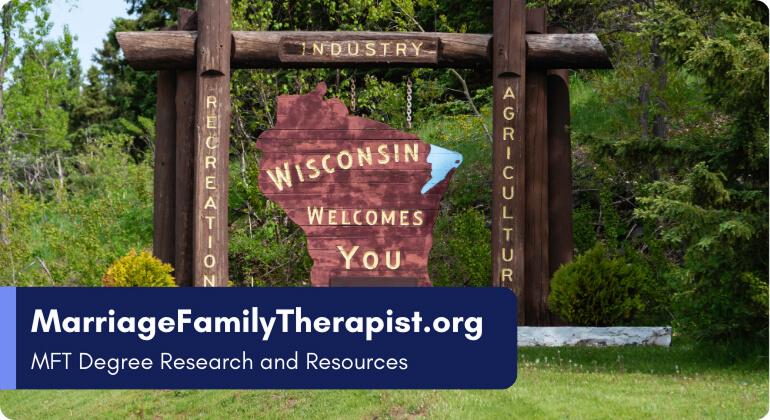Best Marriage & Family Therapy (MFT) Degree Programs in Wisconsin 2025
Wisconsin provides several pathways for students pursuing a career in Marriage and Family Therapy (MFT). The state is home to regionally accredited MFT programs that prepare students for state licensure, and students also have the option to pursue COAMFTE-accredited online programs that meet Wisconsin’s LMFT licensure requirements.
With a growing need for mental health professionals, particularly in rural communities and underserved populations, Wisconsin offers a stable job market for licensed therapists. LMFTs in Wisconsin can work in private practice, community clinics, hospitals, and school-based mental health programs, making it an attractive state for those looking to enter the family therapy profession.
In this guide
2026 Best Marriage & Family Therapy (MFT) Programs in Wisconsin
University of Wisconsin-Stout
Menomonie, WI - Public 4-Year - uwstout.edu
Master's - M.S. Marriage & Family Therapy
Campus Based - Visit Website
UW-Stout's M.S. Marriage & Family Therapy program provides comprehensive clinical training through a COAMFTE-accredited curriculum focused on systemic-relational approaches. The 14-student cohort model operates on a Monday-Tuesday schedule with extensive hands-on experience in the campus clinic, requiring 300 clinical practice hours. Graduates meet Wisconsin and Minnesota licensure standards and can pursue an optional Sex Therapy Certificate. Admission requires a 2.75 GPA, three recommendation letters, and applications by January 15. This master's program does not require an entrance exam and prepares students for diverse mental health careers with strong ethical foundations.
- COAMFTE-accredited since 1977
- Cohort model, 14 students
- Monday-Tuesday class schedule
- On-campus state-of-art clinic
- 300 clinical practice hours
- Meets WI and MN licensure
- Optional Sex Therapy Certificate
- Application deadline January 15
- 2.75 minimum GPA required
- 3 recommendation letters needed
Graduate Certificate - M.S. Marriage & Family Therapy
Campus Based - Visit Website
The University of Wisconsin-Stout's M.S. in Marriage & Family Therapy is a COAMFTE-accredited program that has been training therapists since 1977. Students develop advanced clinical skills through a systemic-relational approach in a 14-student cohort model with Monday-Tuesday scheduling. The program features 300 clinical practice hours in an on-campus state-of-the-art clinic and meets Wisconsin and Minnesota licensure requirements. With a 2.75 GPA requirement and January 15 application deadline, this program emphasizes diversity, ethics, and offers an optional Sex Therapy Certificate. No entrance exam is required for this master's level program.
- COAMFTE-accredited since 1977
- 14-student cohort model
- On-campus state-of-art clinic
- Monday-Tuesday class schedule
- 300 clinical practice hours
- GPA requirement: 2.75
- Application deadline: January 15
- Meets WI and MN licensure
- Optional Sex Therapy Certificate
- Diversity-focused curriculum
Other MFT Programs Available in Wisconsin
Wisconsin has regionally accredited programs with an MFT specialization, but no COAMFTE-accredited programs at this time. However, students can still complete regionally accredited master’s programs that align with LMFT licensure requirements or choose COAMFTE-accredited online programs from neighboring states.
Top MFT-Related Programs in Wisconsin
- Edgewood College – Master of Science in Marriage & Family Therapy
Edgewood College offers a regionally accredited MFT program that provides comprehensive training in couples therapy, family systems interventions, and clinical mental health counseling. Students complete supervised clinical hours in Wisconsin-based therapy centers, hospitals, and private practices to meet licensure requirements.
Wisconsin’s Quickest MFT Programs
Students looking to earn their MFT degree quickly can take advantage of accelerated programs, hybrid coursework, and early internship placements to speed up their licensure timeline.
Ways to Complete an MFT Degree Faster
- Enroll in a Full-Time Program: Full-time enrollment allows students to complete their MFT degree in approximately two years.
- Start Clinical Training Early: Programs that integrate internships in the first year allow students to finish their required clinical hours faster.
- Choose an Online Accelerated Option: Some out-of-state online programs offer accelerated tracks, helping students graduate in as little as 18–24 months.
- Transfer Relevant Graduate Credits: Students with previous coursework in psychology, counseling, or social work may be eligible to transfer credits, reducing overall program length.
By selecting an MFT program with structured clinical training and fast-paced coursework, students in Wisconsin can enter the workforce as LMFTs sooner.
Wisconsin’s Cheapest MFT Programs
Tuition costs for MFT programs in Wisconsin vary, but students can find affordable options by choosing public universities, applying for financial aid, and considering online alternatives.
Ways to Make an MFT Degree More Affordable
- Choose Public Universities: Schools like University of Wisconsin-Stout may offer lower tuition rates than private institutions.
- Apply for State & Federal Financial Aid: Wisconsin provides grants and scholarships for students pursuing careers in mental health.
- Consider Employer-Sponsored Tuition Reimbursement: Some mental health agencies and hospital systems in Wisconsin offer tuition assistance for employees pursuing MFT degrees.
- Use Loan Forgiveness Programs: LMFTs working in high-need or rural areas may qualify for federal and state loan repayment programs, reducing education costs.
- Explore Online Programs with Lower Tuition: Many COAMFTE-accredited online programs offer competitive tuition rates, making them an affordable alternative for Wisconsin students.
By researching cost-effective education options, applying for financial aid, and considering loan forgiveness programs, students can reduce their financial burden while earning an MFT degree in Wisconsin. If you are looking for a cheap MFT program, you can check out our full guide on the cheapest MFT programs available to prospective students.
How to Become Licensed as an LMFT in Wisconsin
Educational Requirements for LMFT Licensure
Students must complete a master’s or doctoral degree in Marriage and Family Therapy or a closely related field. While a COAMFTE-accredited program is not required, students must ensure their program includes courses in marriage and family therapy theories, ethics, and clinical assessment techniques.
Supervised Clinical Experience
After earning a degree, students must complete 3,000 hours of supervised clinical experience, with at least 1,000 hours of direct client contact. These hours must be supervised by an LMFT-approved clinician and can be obtained through internships in private practices, hospitals, and mental health clinics.
Passing the National MFT Exam
To qualify for licensure, candidates must pass the Association of Marital & Family Therapy Regulatory Boards (AMFTRB) National MFT Examination. This exam assesses clinical therapy knowledge, ethical practice, and treatment planning techniques.
Wisconsin State Licensure Application & Fees
Once all requirements are met, candidates must submit an application to the Wisconsin Department of Safety and Professional Services, which includes official transcripts, documentation of supervised hours, and exam scores.
LMFT Career & Salary Outlook in Wisconsin
Wisconsin offers a growing job market for Licensed Marriage and Family Therapists (LMFTs), particularly as the demand for mental health professionals continues to rise statewide. While urban areas like Milwaukee, Madison, and Green Bay have established private practices and behavioral health networks, rural regions of Wisconsin face shortages of qualified mental health providers, creating high-demand opportunities for LMFTs willing to serve underserved populations.
Earnings & Job Prospects for LMFTs in Wisconsin
The average salary for LMFTs in Wisconsin is approximately $62,000 per year, though earnings can vary based on location, experience, and specialization. Entry-level therapists often start around $50,000 annually, while experienced LMFTs and those in private practice can earn upwards of $90,000 or more.
- Private practice therapists in major metropolitan areas often earn the highest salaries due to the ability to set their own rates and specialize in high-demand areas like trauma counseling, couples therapy, or child and adolescent mental health.
- LMFTs working in nonprofit organizations and community mental health centers often receive competitive salaries along with loan forgiveness opportunities for serving high-need populations.
- School-based LMFTs and those working in integrated healthcare settings can expect steady salaries with comprehensive benefits, as schools and hospitals continue to invest in mental health services.
Expanding Mental Health Services in Wisconsin
As mental health awareness grows, Wisconsin is expanding public and private resources for family therapy, addiction treatment, and trauma-focused care. The state is seeing increased insurance coverage for LMFT services, making therapy more accessible to families and individuals, which in turn fuels demand for licensed professionals.
Wisconsin’s legislation supporting teletherapy expansion has also created new job opportunities for LMFTs, allowing greater flexibility for therapists looking to work remotely or serve clients in rural areas. Many Wisconsin-based mental health clinics and private practices are incorporating virtual therapy sessions, increasing accessibility while broadening career options for LMFTs.
Is Wisconsin a Good State for LMFTs?
Wisconsin provides a stable career path for LMFTs, with opportunities in private practice, hospitals, school counseling programs, and community mental health settings. While the state does not currently offer COAMFTE-accredited programs, students can still qualify for licensure by completing regionally accredited programs and fulfilling the necessary clinical training requirements.
For those considering an LMFT career in Wisconsin, the state’s growing demand for therapists, competitive salaries, and expanding mental health initiatives make it an appealing place to build a career in family therapy. Whether working in urban centers with established mental health networks or serving underserved rural populations, LMFTs in Wisconsin play a vital role in strengthening communities and improving mental health outcomes statewide.


Related Articles
- From Student to Therapist: What to Expect in Your MFT Clinical Internship
- Support That Affirms: Navigating Mental Health as LGBTQ+
- MFT Doctorate Degrees: DMFT vs PhD – Who Should Pursue Each Path?
- The ROI of an MFT Degree: Analyzing the Financial Investment in Your Therapy Career
- LMFT vs MFT: Is Licensure Necessary for Your Therapy Career?
- Who Will You Treat as a Marriage & Family Therapist? A Career Guide for Aspiring MFTs